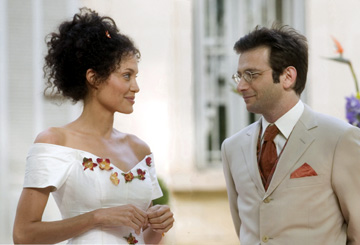 Angelina Jolie and Dan Futterman are the happy couple before terrorists strike in ‘A Mighty Heart.’
Angelina Jolie and Dan Futterman are the happy couple before terrorists strike in ‘A Mighty Heart.’
|
| A Mighty Heart Starring Angelina Jolie and Dan Futterman. Directed by Michael Winterbottom. Written by John Orloff, based on Mariane Pearl’s memoir. Rated R. |
|
A D V E R T I S E M E N T
|
|
|
|
A D V E R T I S E M E N T
|
|
Reporting Live
A great director cuts into A Mighty Heart, but changes the pace to good effect.
By KRISTIAN LIN
Michael Winterbottom has spent the last 10 years as one of the world’s most prolific and influential filmmakers, and yet A Mighty Heart marks the first time that a film of his has reached the big screens of Fort Worth. Until now, local film enthusiasts have had to journey to Dallas or resort to DVD to follow his career. What a fascinating career it has been, though, even if this British director hasn’t had much exposure in America’s mass market. Winterbottom’s resumé includes two dour Thomas Hardy adaptations (1996’s Jude and 2001’s The Claim), a lesbian serial-killer flick (1994’s Butterfly Kiss), a futuristic sci-fi thriller (2003’s Code 46), and a pair of bleak solipsistic dramas set in working-class England (Wonderland and With or Without You, both from 1999). These movies are so different from one another that they make the director hard to pigeonhole, but they all share the same unpolished look, objective tone, and stubborn unwillingness to conform to traditional three-act storytelling structure. Winterbottom experiments relentlessly, and sometimes his experiments blow up, as in 2004’s 9 Songs, an attempt to chart a couple’s relationship and breakup through scenes of the two lead actors attending rock concerts and having unsimulated sex. His only readily accessible movies — and his best ones, it so happens — are his two delightful documentary-style comedies starring Steve Coogan (2002’s 24 Hour Party People and last year’s Tristram Shandy: A Cock and Bull Story). The above might seem to make him an odd choice to film A Mighty Heart, the memoir by Cuban-French journalist Mariane Pearl, the widow of Daniel Pearl, the Wall Street Journal bureau chief who was kidnapped and subsequently murdered by Islamic extremists in Pakistan in early 2002. Yet Winterbottom is better qualified than most to tell this story, having used his films to explore aspects of the Muslim world ever since 9/11, in 2002’s In This World and last year’s stomach-turning The Road to Guantánamo. He reuses some news footage from that last film in this one, which stars Angelina Jolie as Mariane and Dan Futterman as Danny. Near the beginning, she sees Danny off in a taxicab as he pursues one last interview before their planned trip to Dubai so she can give birth to their first child. He never comes home, and this is where most Hollywood filmmakers would settle into the familiar rhythms of a hostage drama. Winterbottom instead keeps us off balance, switching constantly between Mariane and supporting characters who are trying to manage the situation, including a Journal colleague of Danny’s (Archie Panjabi) and a Pakistani detective in charge of the investigation (Irrfan Khan, giving the film’s best performance as a calm, purposeful cop who industriously plows through Karachi’s neighborhoods, yanking guys out of restaurants and madrassas who might lead him to the missing journalist). The scenes are often limited to exchanges of a few lines of dialogue before the director cuts to someone somewhere else. This strategy can easily overheat a film, but here the effect is strangely cooling, preventing the movie from bogging down in soppiness and speechifying like other well-intentioned Hollywood depictions of Third World misery. It also takes the emphasis off the actors, Jolie’s star presence notwithstanding, and places the focus on the tangle of personal and political relationships surrounding the kidnapping, all of which pose such a challenge to the investigators. Much like the book it’s based on, the movie behaves like a police procedural rather than a testament to a widow’s inner strength. The thing is, by doing the former, the book achieves the latter. The movie fails on the emotional level, though, because it doesn’t give you much sense of who Daniel Pearl was. The personal details about him — his love of music, his habit of making lists of things he liked, his belief that journalism could improve the world — were what made Mariane Pearl’s book such a moving document. Despite a few well-incorporated flashbacks showing the Pearls in happier times, the film doesn’t have enough of this, and as a result Daniel’s fate doesn’t pack the emotional wallop that it should. The scene near the end with Mariane’s wailing reaction to the news of her husband’s death is the movie’s one serious misstep. A conventional Hollywood treatment might have prepared us adequately for a scene like this, but here it feels as if the filmmaker is just tossing it to us out of a sense of duty: You want something to weep over? Here it is, you cretins! Even so, Winterbottom’s coolly fragmented approach still succeeds in distinguishing the film from similar efforts. A Mighty Heart dares to take on a serious subject at a time of year when the multiplexes are overstuffed with popcorn cinema, and it does so in a fleet-footed way that informs us about the world without mistaking ponderousness for profundity. For moviegoers who don’t switch off their social consciences for the summer, this tribute to a man who gave his life for his beliefs is a welcome dose of cold reality.
 Email this Article...
Email this Article...

